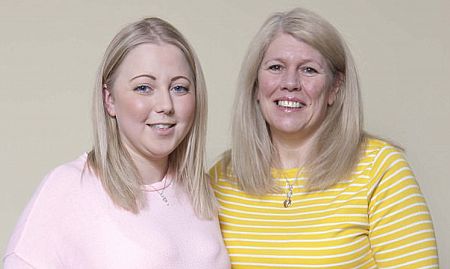'I'll never forget the moment I was told my baby would die at birth'
27/03/2017 Daily Mail
At seven months pregnant, Sandra had been told her baby girl was so sick she'd be stillborn, or die shortly after birth.
After her ten week scan, follow up scans diagnosed her unborn daughter with a fatal case of polycystic kidney disease (PKD).
'I'll never forget the moment I was told my baby would die at birth,' Sandra says. 'I burst into tears. Andrew was devastated.'
'I'm Catholic, and I wanted to have my baby naturally and to have her baptised, even if she lived for just a few minutes.'
Her consultant had told her to get an abortion, injecting the baby in the womb; then delivering her dead baby by Caesarean section. Sandra had refused. She didn't think her child would survive — the medical evidence was stacked against it — but following her heart, she'd elected for a natural birth in the hope of spending a few precious moments with her baby before she died.
They had even gone as far as to plan their baby daughter's funeral. Yet tiny Rachel, weighing little over 2lb, was unexpectedly born alive, and was rushed into special care.
Her survival — against the odds and the predictions of well-intentioned doctors — is a 'sober warning bell', as one expert put it, reminding medics to consider carefully their advice in such cases.
'After the delivery, when the midwife said our daughter wasn't dying, it was surreal. I was so thankful I'd not agreed to have the injection that would have ended my baby's life.'
Sandra, now 56, recalls: 'Rachel was tiny. She looked like a fragile doll. It was very stressful, but it felt like a miracle.'
Even after birth, things we're straight foreward as Rachel lapsed into a coma due to potential brain damage. After six weeks, doctors agreed to perform one last scan before switching off the life support.
'Andrew and I went to the hospital prepared to say a final goodbye to Rachel,' says Sandra.
'I was sobbing uncontrollably. But on arrival, a female doctor was crying, saying the 'black cloud' on Rachel's brain had gone. She'd shown signs of life — making tiny movements.
'That day was when life began again. For all of us.'
Rachel started feeding via a drip, and slowly gained weight. After a few weeks, her parents were allowed to take her home.
At three months, Rachel still weighed only 7lb. 'Her face was so small, her blue eyes looked really big,' says Sandra. 'One doctor said: 'You'll be lucky to get another year.'
'He said that every year for the first five years of Rachel's life.'
Remarkably, two decades later, Rachel is fit and well. Now 25, with a degree in fashion textiles, she lives in West Malling, Kent, with her parents and is engaged to electrician Lee Lockyer, 26.
Her life hasn't been without complications, but she has pulled through these and is living life to the full:
'I hope by telling my story we give others hope,' she says. 'I'm living proof that where there is life, there is hope. Always.'
Of the 185,824 abortions carried out in England and Wales in 2015, 3,218 — two per cent — were performed under 'ground E', due to a risk the child would be born 'seriously handicapped'.
There is a very serious threat in Northern Ireland to babies like Rachel, and we need to fight for better perinatal hospice care and better services during difficult pregnancies instead of legalising abortion.
Help us in our "Personhood begins at conception" campaign to make sure Stormont continues to protect the lives of ALL unborn children, regardless of their disabilities.


